Innovating Forward: Committing to Food and Agriculture
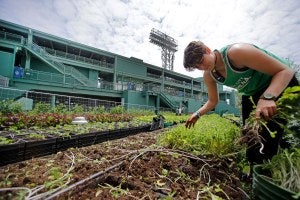 Play Podcast
Play Podcast
About the Episode
There is invaluable insight we can gain from the history of food and agriculture, from planting techniques to the best times to harvest. But this doesn't mean that we should exclusively look to the past; we must also innovate forward. In this week's episode of Youth in Agriculture: Transforming Local Food Systems, Lily Fillwalk and Robert Paarlberg discuss new approaches to global food and agriculture, including urban farming and soil-carbon analysis, with the goal of committing to a more sustainable food system.
[Intro music.
Natalie Burdsall: INTRO: Hello and welcome to the limited podcast series “Youth in Agriculture: Transforming Local Food Systems,” produced by the Chicago Council on Global Affair’s Center on Global Food and Agriculture. Today, we will be listening in on a conversation between Lily Fillwalk, a master’s student at the Yale School of the Environment, and Robert Paarlberg, an associate at Harvard University’s Weatherhead Center for International Affairs.]
Robert Paarlberg: Well, greetings to everybody. I'm Rob Paarlberg. I'm a professor of public policy emeritus at the Harvard Kennedy School and a professor of political science emeritus at Wellesley College. I've worked with the Chicago Council on Global Affairs for, off and on, 15 or 20 years. My career in food and agriculture is easy to explain. My dad grew up on a farm in Indiana. I worked on that farm when I was a teenager and enjoyed the exposure to something that not everybody gets to encounter firsthand. My dad went on to get a Ph.D. in agricultural economics and to become a senior government official. I admired him, so I started looking for ways to follow a somewhat similar path. When I graduated from college, I went to graduate school and got a Ph.D. in political science instead of economics. I had to… I had to achieve some separation in order to respect myself, but my interest in food and agriculture was there throughout.
I took a trip after I graduated from college to India to visit my brother, who was a Peace Corps volunteer, and I saw a rural poverty there that I found appalling. And I thought if I ever get a chance to do something to study or to propose solutions to this problem, I'm going to... I'm going to grab it. I taught standard international relations for a decade or so, but I kept being drawn back into international food and agriculture, and I found I had an advantage because very few political scientists go into international food and agriculture – it's a field dominated by agricultural economists. So, I had a niche advantage that I worked as much as I could. I ended up doing research, writing, and consulting for a number of good international organizations like the International Food Policy Research Institute and the Bill & Melinda Gates Foundation and the US Agency for International Development and Winrock. I also taught and I also... I also wrote books. I've written nine or 10 books on international food and agricultural policy over the years. In fact, just earlier this week I finished correcting the page proofs for the third edition of an Oxford University Press book I had originally published in 2010, titled Food Politics: What Everyone Needs to Know. It'll be out in August. So that's me.
Lily Fillwalk: Hi, my name is Lily Fillwalk and I am a current master's candidate for environmental science at Yale School of the Environment. Before this, I was at Pitzer College doing a dual degree in studio art and environmental science with a concentration on sustainable agriculture. And, similar to you, I grew up in Indiana. And I grew up in Muncie, Indiana, and it is when I was in high school it became a food desert, and I was able to see the effects of food insecurity on my hometown and that really inspired me to kind of like learn more about environmental justice and delve deeper into the food community. And I participated in the World Food Prize Youth Events that were happening in Indiana, and that is how I actually ended up with a Wallace Carver Fellowship with the USDA. And I feel really grateful to be a part of all of these amazing initiatives. And I've learned a lot and I am taking that knowledge into my work at Yale currently and I am in a Justice Equity Diversity Sustainability Initiative Laboratory directed by Dr. Dorceta Taylor and it is focused on food justice and food insecurity, and it’s just... we're doing really great research and I'm really glad to be a part of it, currently. So, that's kind of where I'm at right now.
Robert Paarlberg: Great. Did you attend the World Food Prize conference, actually, in Des Moines?
Lily Fillwalk: Yeah, I was actually a leader for the Youth Institute and then we also virtually attended the Des Moines one. So, I really have been more involved in youth institutes and helped when I was in college, then was leading high schoolers through those initiatives as well.
Robert Paarlberg: Yeah, a lot of what you just described probably coincided with the COVID era and you had your film zoom conferences.
Lily Fillwalk: Yeah.
Robert Paarlberg: I hope they're coming to an end soon. How do you combine studio art with your interests in food and agriculture and social justice?
Lily Fillwalk: I think that... obviously, I'm not pursuing art academically anymore, but I think that during my time at Pitzer I was really focused on creating ecologically informed art and my senior thesis was looking at crows and climate change and how crows were impacted and were indicator species for climate change. And I was just exploring the relationship between how you could document a species through photography and have it coincide with climate change. And, so, I tried to create an intersection between the two, and it was really great and I still practice art in my free time, but I'm definitely more involved in the science aspects of the movement now.
Robert Paarlberg: That's great. I've had black cats and they're almost impossible to photograph. You must have the same problem with crows.
Lily Fillwalk: Yeah, it was definitely difficult. I was wondering... when you were speaking about your work, I was wondering, how does your work inform your perception of global food and agriculture, and what impact do you think throughout your career that you've had on the food and agriculture movement?
Robert Paarlberg: Well, it's hard to measure impact. I've done impact assessments for the International Food Policy Research Institute, and just because you do something and then something happens later, it doesn't mean that you were in any way the cause of that event. The attribution problem is almost impossible, but my approach has always been: be true to your commitment to solid research and your interest in clear analysis, and invest some time in communicating and publishing your work to a general audience, not just a specialized audience, and hope for the best. So, that's been... that's been my approach. But I guess one of the things that has had the greatest impact for me has been the book that I'm... that I'm just finishing the third edition of. This is a book that's been in fairly wide use at the university level in undergraduate and also graduate level courses. Oxford University Press have found it to be... has found it to be a commercial success for them. And it gives me a chance to put my ideas in front of a much wider audience in a way that going around to make small little talks here and there or joining an organization that has influence but not necessarily expresses my voice. It's... for me, that's an attractive approach. And I've encountered people, I've encountered people in Washington, DC and in Africa who have surprised me by saying, “oh, you're the author of that book.” And that's always... that's always fun.
Lily Fillwalk: Congratulations. That's a big accomplishment. I was also wondering… a lot of my thesis—current thesis work, is focused on urbanization and food systems within urbanization. I was wondering, how you think, like, global food movements and systems will change with the increase in urbanization that is happening at the rapid pace right now?
Robert Paarlberg: Yeah, it's an extremely rapid pace in Africa, where I do quite a bit of my work. I'm going to Africa this coming summer. I'll be in Nigeria, Ghana, and Cote d'Ivoire looking at the protection of mostly urban livelihoods in the face of climate change and sea level rise. The capitals of all three of these countries are coastal capitals and their infrastructure and the... the populations and their commercial activities are all threatened by coastal storms and sea level rise, and the threat is increasing not only because climate change is unabated, but also because of the rapid urbanization, the... in migration of more people into these threatened urban areas. If you look at Accra, the capital of Ghana. In... right now, the population is twice as great as it was in 1993. Twice as great. Most of that increase comes from migration. By 2030, the population will be three times as high as it was in 1993. So, this is... this creates unsolved problems. I won't say unsolvable, but it's without precedent that these large cities would be expanding so quickly in such a climate-threatened environment.
I'm doing work with the Salata Institute at Harvard University that has given a grant to a team to go and look at what local scholars, local organizations, local NGOs envision as the escape from this problem. Do you build coastal defenses to protect the infrastructure? Do you? That's very expensive. Do you invest in the resilience of these cities, give them better advance warning of storms, better emergency management capabilities, better evacuation infrastructure so that they'll be floodable but livable? Or do you look for a way to encourage the movement of people back and infrastructure back from the coast? And a way to discourage further in migration, and very quickly on that, the best way to slow uncontrollable and unmanageable migration into cities in Africa is to improve the productivity of agriculture. If people could be making more money on the farm, they wouldn't flood into cities as much as they do.
Lily Fillwalk: That’s really interesting. Yeah, I've heard... I was talking to a professor at Columbia the other day that was part of their climate school and they were saying... talking about the sustainability of like urban spaces as being more sustainable than suburban spaces, and just talking about, like, the different resources and how... referring to the city as an ecosystem. So, I think that the emerge... the emerging movement of urban ecology is something that I'm really looking forward to. There are so many intersections of different disciplines. It’s really exciting.
Robert Paarlberg: Yeah. You know, we're talking about youth who are making a decision to commit to food and agriculture. And one of the... one of the most interesting phenomena I've seen over the last 15 years is younger people who are creating the world of modern urban agriculture... it was not a field that anyone even envisioned 20 years ago. And if it weren't for younger people who have gone into this and invested their intelligence and commitment in innovating solutions for urban communities, well, we wouldn't have this field. So, this is something that older scholars like me have to thank younger scholars for, for helping to create. There are a lot of unsolved problems still—the economics behind vertical farming or rooftop farming is still relatively unproven because real estate costs and labor costs are so much higher in urban areas than they are in rural areas. But there are appealing examples and proof of concept out there that brings wonderful innovation. And in my... in my view, yes, the food system we have now needs to be improved dramatically. To protect the environment, to increase social justice, to improve human nutrition. But I'm not attracted to some of the fashionable suggestions that we simply go back to the way things were and return to local organic farms that are... that grow diverse crops and without any modern chemicals. Instead of going back, I'd like to innovate forward, and I think the people working on urban agriculture are in the lead of that worthy project.
Lily Fillwalk: Yeah, I am working with local community gardens in New York, currently, for my thesis research. I'm looking at soil carbon levels and within different green roof structures and looking at what factors are influencing that. But just in talking to some of the local community members, they were talking about all these different hindrances to green roofs and the construction of green roofs that I didn't think of, as in... a lot of buildings in New York wouldn't want a green roof on top of them because then they couldn't build up in development later on, as well as actually carbon emissions from constructing the actual green roof might not be offset by the green roof itself. And so, it's definitely really interesting being on the ground, thinking about what actually makes this successful green space in urban areas.
Robert Paarlberg: Right. And have you… You have, you have scientific training?
Lily Fillwalk: Yes.
Robert Paarlberg: Is that the niche that you're going to enter through? To get to get yourself noticed, to get some credentials as an expert on something, and to be an innovator? A lot of people don't specialize, and they don't... they don't realize the value of some early specialization. You can always generalize later, but in order to launch a career you need to… there's something about you that has to be noticed that's different from everybody else. And I'm guessing in the urban agriculture space, there aren't too many people who've invested in the science of soil biology and who can be the person sitting around the table to vet an idea for those very serious concerns.
Lily Fillwalk: Yeah. And in my undergraduate, my senior thesis… my senior biology thesis was focused on soil microbial communities of green roofs, and I worked with Dr. Theodore Muth at Brooklyn College and it was a really great project to be a part of. And going forward, I wanted to focus more on the intersection between these spaces and also communities and engage in environmental justice work because I've been in a lot of organizing spaces that aren't necessarily science-focused or science spaces that aren't necessarily on community-focused. And I think that I really want to explore the intersections of those two areas by looking at the soil and biology of spaces that communities have formed and how they're building community and climate resilience in these spaces as well. And that's a gap in the literature that I've found in my research. And so, I really hope to specialize in that and it's... it’s interesting. I'm really excited for my research this summer. But, since we're on the topic of talking about younger people in agriculture, how do you and the Harvard Kennedy School Sustainability Science Program as a whole encourage youth involvement within the agriculture movement?
Robert Paarlberg: Well, if you're at a university, you're not in a position to hire people for an entry level job that will eventually become a career. But people at the Kennedy School, like me, spend plenty of time consulting with organizations that do hire people for entry level positions. And, so... and students at the Kennedy School aren't shy. They'll let you know that in their two years there they would like to have a good internship in the first summer that might lead to some good job offers after the second year. And so, they'll approach you, they'll do some research on you, find out what organizations you've worked for and express an interest in some introductions. And so, that's usually the path that my students take. They'll come to me and get my advice on a position that they saw posted or an organization that they know I've worked with and then... then it's just a matter of me getting enough of a grip on what's special about them and what will be noticed about them and communicating that to friends that I have inside organizations at a higher level. And it's a satisfying way to encourage people into… not into the academic world. Very few of my Kennedy School students want to be professors or lifetime researchers like me. They don't want to be sitting in front of a screen all day long. They... they're out there on the move and they want careers that will allow them to move around and see a lot. And so, they know what they're after. And it's usually not just knowledge creation or a safe, satisfying career teaching at a university. They want to make things happen and they want to spend time outdoors. They want to be meeting a lot of different people over the course of a month or two. They want organizations that will give them opportunities to make lateral transfers later in their career to other organizations. And so, helping them get a first step into one of those organizational environments is one of the few things that academics can do to help... to help these kinds of students.
I took a look at your background, and it looks like you have... you have research interests, you have environmental and social justice interests, you have community leadership interests. But you obviously have some significant leadership potential as well. You were a student body president when you were in college, is that true?
Lily Fillwalk: Yes, I was a senior class student body president.
Robert Paarlberg: You should be aware of that... that you have those interests and skills and... in your career choices, look for organizations that you might want to be in charge of someday and grab opportunities to move in that direction.
Lily Fillwalk: Thank you. Yeah, I hope to... I think that, currently, I'm going to stay in academia, but I hope one day to enter industry and be part of more... leadership within the environmental movement. I was also wondering if you had any advice to young people interested in entering the food and agriculture space? What do you think the benefits of working in this field are and why do you think this field is important within... with the impacts of climate change and how do you think the movement will change going forward?
Robert Paarlberg: Yeah, it’s... the field is changing rapidly, and some of my views on this are not highly popular. When I make the argument to people in Washington, DC who are working on traditional hunger issues and working with traditional hunger fighting programs... when I tell them, well, wait a minute. If you read the data carefully, you'll see the levels of protein energy deficit in the American diet have dropped dramatically. We have a nutrition crisis, but that's better understood in terms of micronutrients. It's not macronutrients. And we have... we have a new dietary challenge linked to excessive consumption of ultra processed foods with added quantities of sugar, salt, and fat. And if... I mean, right now, 42 percent of American adults are clinically obese. That's three times the level of the 1960s. And the National Institute of Health estimates that obesity now and diseases linked to obesity in the United States contribute to the death of 300,000 people a year and it's going up. And, so, that's a whole new challenge. That's a whole new challenge, especially for people in the public policy space, because designing policies to shape food consumption is tricky in a society like ours, where personal choice and individual freedom is sacrosanct.
My take on this is to pay close attention to the role of food companies in designing food products that are intended to be virtually addictive because they have added quantities of sugar, salt, and fat, and because they're ultra processed. I would like to see stronger policies in… this takes us a little bit away from agriculture, but it's the way that my research has recently gone. I would like to see the United States do some of the things that are being done in Europe. In Europe, they have restrictions on advertising foods high in sugar, salt, and fat to children. The United States does not. In Europe they have mandatory nutrition labeling on the front of food packages that you can make sense of at a glance. The United States does not have any anything like that. It’s... in Europe, they have taxes on sugar-sweetened beverages and on other unhealthy foods. The United States has that at the municipal level in six or seven cities, but nationally, and even at the state level, that's politically verboten. If I were starting out all over again today, I would probably look at this political challenge and see if there's some way to break the code of American culture and allow these European-style policies to be embraced by the United States Congress.
Lily Fillwalk: I'm taking a class right now that reminds me a little bit about what you're talking about. It's titled “Global Food Challenges” and it's taught by Dr. Wargo... Dr. John Wargo at the Yale School of the Environment and we're focusing a lot… he has a background in like public health and environmental history and we're focusing on a lot of issues comparing our food system within America to other countries, too. And it was just interesting to learn about... especially considering other places like Europe have a more… we were like looking at supplements, too, and they have like high regulations of different nutritional supplements and just it has been really eye-opening. I think a lot of my research has been focused on more of like a local and nationwide scale. But I think it's really interesting to compare our food systems to other food systems when thinking about the innovation within the field.
Robert Paarlberg: Yeah, absolutely. As long as I'm throwing out advice here... I don’t know if this applies or not, but international travel is as good as classroom knowledge. In learning to see problems and analyze them with a sure touch, it helps to have had firsthand encounters with societies other than our own, with societies far less affluent than our own. And international travel... it's a paradox. It's most valuable when you're still very young. It's easiest to make use of when you're still very young, but it's least affordable when you're still very young, unless you spot a university program, a research institute, a private company that will pay for your plane ticket and your hotel. And there's a surprising number of them out there. And also I've noticed that when people get a little older and start a family and have children at home, international travel becomes more difficult. And you want to do both. But if you want to be sure you get enough international travel in to take full advantage of that of that option, the sooner you start the better.
Lily Fillwalk: Yeah, I am. I definitely am trying to take advantage of some of the programs that Yale is doing. I know that our lab is focusing on the next COP conference in Dubai. And so, I think that I really want to be more intentional about how I'm spending my time here and trying to take advantage of all of those resources.
Robert Paarlberg: Yeah, well, you're in a great place and you're off to a wonderful start. But don't be afraid to push yourself into things that you haven't quite done yet.
Natalie Burdsall: I want to thank you both, Lily and Robert, for providing your thoughts and insights on youth engagement in global food and agriculture. Your discussions of the effects of urbanization and sustainability on agriculture, as well as opportunities for professional development illuminate the complex web of issues young people are inheriting, while providing valuable insight into how they can use their agency to make lasting change in the food system.
[Natalie Burdsall: OUTRO: And thank you for tuning in for this episode of “Youth in Agriculture: Transforming Local Food Systems.” As a reminder, the opinions you heard belong to the people who express them, and not the Chicago Council on Global Affairs. This episode is produced and edited by me, Natalie Burdsall. Thank you for listening—we’ll see you again next week.
Outro music.]


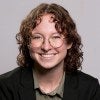



Other Episodes
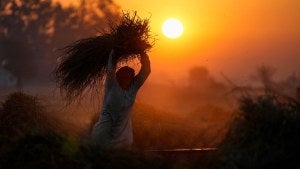 Food and Agriculture
Food and Agriculture
How do we nourish the population, while protecting the planet from the very act of nourishing us?
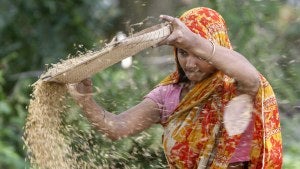 Food and Agriculture
Food and Agriculture
The future of agricultural innovation is dependent on young people. How can we motivate them to get engaged?
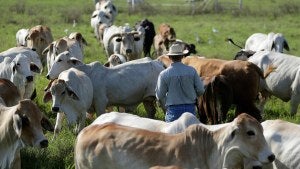 Food and Agriculture
Food and Agriculture
How can advancements in technology and nutrition revolutionize the global food system?
